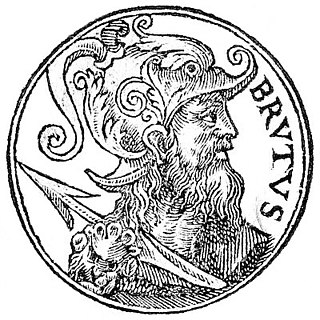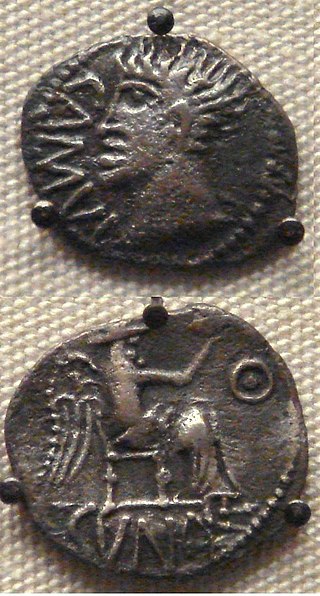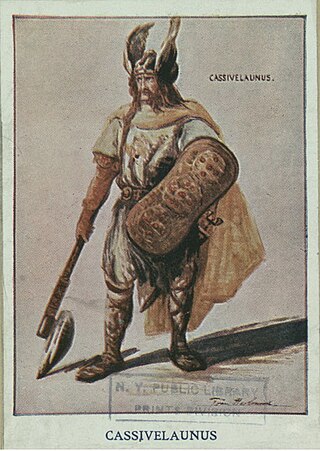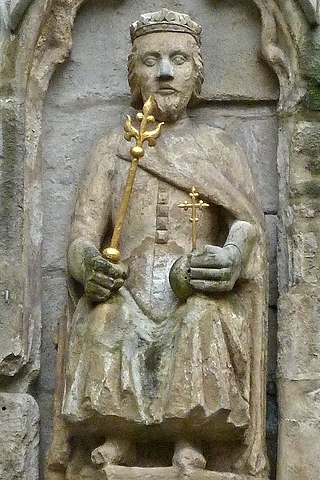Related Research Articles

Brutus, also called Brute of Troy, is a legendary descendant of the Trojan hero Aeneas, known in medieval British legend as the eponymous founder and first king of Britain. This legend first appears in the Historia Brittonum, an anonymous 9th-century historical compilation to which commentary was added by Nennius, but is best known from the account given by the 12th-century chronicler Geoffrey of Monmouth in his Historia Regum Britanniae.

The Matter of Britain is the body of medieval literature and legendary material associated with Great Britain and Brittany and the legendary kings and heroes associated with it, particularly King Arthur. The 12th-century Welsh cleric Geoffrey of Monmouth's Historia Regum Britanniae, widely popular in its day, is a central component of the Matter of Britain.

Cunobeline or Cunobelin, also known by his name's Latin form Cunobelinus, was a king in pre-Roman Britain from about AD 9 to about AD 40. He is mentioned in passing by the classical historians Suetonius and Dio Cassius, and many coins bearing his inscription have been found. He controlled a substantial portion of south-eastern Britain, including the territories of the Catuvellauni and the Trinovantes, and is called "King of the Britons" by Suetonius. Cunobeline may have been a client king of Rome, based on the images and legends appearing on his coins. Cunobeline appears in British legend as Cynfelyn (Welsh), Kymbelinus or Cymbeline, as in the play by William Shakespeare.

Tasciovanus was a historical king of the Catuvellauni tribe before the Roman conquest of Britain.

Cassivellaunus was a historical British military leader who led the defence against Julius Caesar's second expedition to Britain in 54 BC. He led an alliance of tribes against Roman forces, but eventually surrendered after his location was revealed to Julius Caesar by defeated Britons.
Cunedagius was a legendary king of the Britons, as recounted by Geoffrey of Monmouth. He came to power in 850BC.

Belinus the Great was a legendary king of the Britons, as recounted by Geoffrey of Monmouth. He was the son of Dunvallo Molmutius and brother of Brennius and came to power in 390BC. He was probably named after the ancient god Belenus.

Brennius was a legendary king of Northumberland and Allobroges, as recounted by Geoffrey of Monmouth. He was the son of Dunvallo Molmutius and brother of Belinus, probably based upon one or both of the historical Brenni. He came to power in 390BC.
Gerennus was a legendary king of the Britons as recounted by Geoffrey of Monmouth. He came to power in 275BC.

Historia regum Britanniae, originally called De gestis Britonum, is a pseudohistorical account of British history, written around 1136 by Geoffrey of Monmouth. It chronicles the lives of the kings of the Britons over the course of two thousand years, beginning with the Trojans founding the British nation and continuing until the Anglo-Saxons assumed control of much of Britain around the 7th century. It is one of the central pieces of the Matter of Britain.
Arvirargus or Arviragus was a legendary British king of the 1st century AD, possibly based upon a real person. A shadowy historical Arviragus is known only from a cryptic reference in a satirical poem by Juvenal, in which a giant turbot presented to the Roman emperor Domitian is said to be an omen that "you will capture some king, or Arviragus will fall from his British chariot-pole".
Marius was a legendary king of the Britons during the time of the Roman occupation of Britain, as recounted in Geoffrey of Monmouth's pseudohistorical Historia Regum Britanniae. He came to power in 96AD. He was the son of King Arvirargus and ruled following his father's death.
Eudaf Hen is a figure of Welsh tradition. He is remembered as a King of the Britons and the father of Elen Luyddog and Conan Meriadoc in sources such as the Welsh prose tale The Dream of Macsen Wledig and Geoffrey of Monmouth's Latin chronicle Historia Regum Britanniae. He also figures into Welsh genealogies. Geoffrey of Monmouth calls him Octavius, a corruption and faux-Latinization of Old Welsh/Breton Outham. According to the medieval Welsh genealogy from Mostyn MS. 117, Eudaf was a direct ancestor of King Arthur.
Caradocus, according to Geoffrey of Monmouth's Historia regum Britanniae, a pseudohistorical account of the kings of the Britons, was the duke of Cornwall under the reign of Octavius, who became king of Cornwall and died during the Emperor Magnus Maximus' reign.

Dionotus was a legendary king of Cornwall in Geoffrey of Monmouth's Historia regum Britanniae, an account of the rulers of Britain based on ancient Welsh sources and disputed by many historians. Dionotus succeeding his brother Caradocus, and was regent of Britain during the campaigns in Gaul of Emperor Magnus Maximus. The curious thing about this king is that the Welsh chronicles, which parallel most of Geoffrey of Monmouth's book, do not mention this king by name. However, Geoffrey uses Latin versions of Welsh names so he could be referring to Dynod, duke of Cornwall, or Anwn Dynod, Maximus's own son.
Gracianus Municeps was a legendary King of the Britons, according to Geoffrey of Monmouth's Historia regum Britanniae, a largely fictional account of British history. "Municeps" translates to "freedman", meaning this individual was Gracianus the freedman. After the death of Roman Emperor Magnus Maximus, Gracianus seized the throne of Britain upon receiving word of Maximus's demise, by whose orders he had been sent to defend the attacked island while Maximus was campaigning on the continent.
Conan Meriadoc is a legendary British Celtic leader credited with founding Brittany. Versions of his story circulated in both Brittany and Great Britain from at least the early 12th century, and supplanted earlier legends of Brittany's foundation. His story is known in two major versions, which appear in the Welsh text known as The Dream of Macsen Wledig, and in Geoffrey of Monmouth's Historia Regum Britanniae. Both texts associate him with Magnus Maximus, a Roman usurper against the Valentinianic dynasty who was widely regarded as having deprived Britain of its defences when he took its legions to claim the imperial throne. Conan's cousin or sister, Saint Elen, is said to have been Macsen Wledic's wife.
Lucius Tiberius is a Western Roman procurator or emperor from Arthurian legend, who is killed in a war against King Arthur. First appearing in Geoffrey of Monmouth's Historia Regum Britanniae, Lucius also appears in later, particularly English literature such as the Alliterative Morte Arthure and Thomas Malory's Le Morte d'Arthur. The motif of a Roman Emperor defeated by Arthur appears in the Old French literature as well, notably in the Vulgate Cycle.
Guiderius is a legendary British king according to Geoffrey of Monmouth's Historia Regum Britanniae and related texts. He can probably be identified as deriving from the historical Togodumnus.
Mandubracius or Mandubratius was a king of the Trinovantes of south-eastern Britain in the 1st century BC.
References
- ↑ Monarchie Nobelesse website, Bretons
- ↑ Sacred Texts website Histories of the Kings of Britain (Book IV), by Geoffry of Monmouth, tr. by Sebastian Evans (1904)